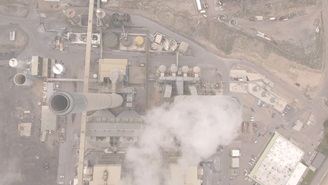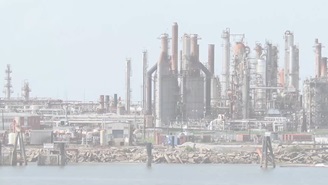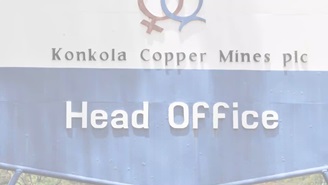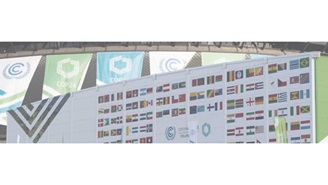Earth Day 2019 | The Water Scarcity Challenge
Earth Day 2019 is focused on protecting the species that make up our natural environment. With nearly three-quarters of the Earth’s surface covered in water, it’s a natural resource that we can’t take for granted. Human activity has irrevocably impacted this natural resource, affecting the quality and quantity of water available for consumption and for the natural habitat. In this article, we examine the role companies can play in addressing this water crisis and the potential opportunities for investors to support solutions.
Passive ESG Investing: Q4 2018 Sample Portfolio Analysis
The global equities market experienced substantial growth over the first quarter of 2019 as the FTSE All-World (AW) index returned 12.5%. But this growth spurt comes on the tail of a significant selloff during the preceding quarter; the total return of the FTSE AW over Q4 2018 sunk to -12.6%.[i]
Sustainalytics’ Carbon Risk Rating: Platypus Asset Management Live Test
Climate change is at the centre of public debate: from school strikes around the world to a recent landmark court ruling blocking a new coal mine in Australia on climate grounds. It is also increasingly becoming an investment risk and investors are looking to understand how this risk can affect their portfolios.
How will ESG investing fare in a volatile or bear market?
Much has been written about the rise of responsible investing and environment, social and governance (ESG) integration over the past decade. From 2014 to 2016, assets that systematically considered ESG factors in the investment process grew from USD 7.5 trillion to USD 10.4 trillion, with continued momentum over the past several years[i]. However, recent commitments to ESG integration (vs. values-based strategies) have yet to be tested by a significant market downturn. The spike in market volatility experienced in late 2018 has led some to question whether the consideration of ESG factors by investors will continue to flourish in a market environment characterized by investor fear and valuation corrections.
Huawei and Beyond: Increasing Scrutiny of China’s Technology Sector
In December 2018, Canadian authorities arrested Meng Wanzhou, based on a U.S. extradition request. Ms. Wanzhou is the CFO of Huawei, the world’s largest telecom equipment provider and third largest mobile phone manufacturer. In January 2019, the U.S. Department of Justice (DOJ) charged Huawei and Meng with 23 counts of fraud related to alleged breaches of U.S. sanctions and trade secret theft.
Slavery in the Seafood Industry
On January 30, 2019[i], Thailand became the first Asian country to ratify the International Labor Organization’s (ILO) Working in Fishing Convention (C188). This comes after years of criticism over illegal, unreported and unregulated fishing (IUU) and findings of slavery and human trafficking within its fishing industry.
Self-Driving Technology: Risks and Opportunities through an ESG Lens
As technology and automobile companies race to bring autonomous vehicles (AVs) to the road, we consider the ESG risks and opportunities facing this disruptive technology. Estimates of when AVs will be fully automated vary (Figure 1); however, the consensus is that AVs are inevitable and different stages of automation will be slowly introduced.
Preparing for the Storm: Extreme Weather Events and the Chemicals Industry
In 2017, extreme weather events (i.e., hurricanes and flooding) resulted in USD 344 million in economic losses, globally.[i] Chemical companies are particularly exposed to this risk due to their concentration of assets in regions prone to extreme weather events, such as the Gulf Coast region of the United States. This region is home to several refining and petrochemical plants, and to more than half of the country’s downstream chemical production.[ii] With growing investor concern about the physical impacts of climate change and extreme weather events, we examine chemical companies’ preparedness to face this material issue. We also take a closer look at Arkema as a case study.
The Democratic Republic of the Congo – Presidential elections and mining, what’s next?
Updated March 4th, 2019 On the December 30th 2018, presidential elections finally took place in the Democratic Republic of the Congo (DRC), the first “democratic” elections in the country’s history. A peaceful transition of power in the region is of particular significance to the mining and renewable energy sectors. The DRC produced an estimated 58 per cent of the world’s cobalt in 2018, an essential element in battery technology. Any political instability or collapse into violence after the elections could restrict cobalt supply and potentially drive up the cost of batteries.
The Royal Commission Report: a new path for the Australian finance industry?
On Monday 4 February, the final report from the Royal Commission inquiry into misconduct in the Australian financial sector was published. It contained a scathing review of years of misconduct and of the failures by regulators to appropriately supervise and hold companies accountable. The report also provided 76 recommendations to fix these issues.
Water Risks in Extractive Industries
Water is an important natural input for mining, as extractive operations rely heavily on this natural resource to process the ore. However, the impacts of climate change (higher temperatures and more extreme, less predictable weather conditions) are affecting the availability of water resources globally.
Companies Invest to Extend their Life of Mines
In December 2018, an investor trip was organised to see the operations of Vedanta’s Konkola Copper Mines (KCM) and Glencore’s Mopani Copper Mines (MCM) located in the Copperbelt of Zambia. We’ve been engaging with Vedanta and Glencore for several years as the companies have experienced several ESG issues in their histories. As part of our engagement process, we conduct in-person visits to gain a better understanding of what’s happening on the ground. During this trip we saw how investment can extend the life of mines and continue to support the local communities. In this article I’ll discuss the importance of stakeholder and government relations as these companies make major investments to improve and extend their operations in the country.
The True Cost of Tomatoes: Insights from our Supply Chain Engagement Trip
In late 2019, Sustainalytics traveled to Italy as part of our Stewardship and Risk Food Supply Chain Engagement. We embarked on this trip with a group of investors and Nestlé to gain an understanding of the working conditions in the tomato sector. The goal of this engagement program is to address risks of child labor in the targeted companies’ supply chains as well as remediate potential adverse labor rights impacts.
Value-Based healthcare: are companies embracing the change?
National healthcare budgets are steadily growing worldwide. Increasing budget pressure, ageing populations and the rise of chronic diseases[i] are pushing both developed and developing markets to look for more effective healthcare delivery methods. In the United States, where national health expenditures peaked at USD 3.5 trillion in 2017, the Centers for Medicaid and Medicare Services (CMS) projected the healthcare budget will increase at an average annual rate of 5.5% in the next decade.[ii] [iii] In the United Kingdom, around 70% of healthcare spending goes to the treatment of chronic conditions.[iv] As governments and healthcare providers examine ways to contain healthcare costs without sacrificing quality of the service, value-based healthcare (VBHC) has emerged as a potential solution to create a more affordable, efficient and inclusive healthcare system.
Risk Exposure in a Changing Climate: The Story of PG&E
The destructive California wildfires in November 2018 once again focused investor attention on climate-change related risks. PG&E, the largest utility in the United States, has stated the fires were very likely caused by its equipment. The company has since announced it will file for bankruptcy protection at the end of January in what is being called the highest profile climate-change bankruptcy to date. The company’s expected liabilities from the devastating wildfires in 2017 and 2018 are estimated at over USD 30 billion and the company’s share price has dropped by over 90% since before the 2017 fire. It is currently unclear what would happen in the event of PG&E filing for bankruptcy protection, but state legislators have mentioned the possibility of breaking up the utility, selling off assets, or converting it to a publicly-owned company.
Redefining the purpose of a corporation – theory or practice?
In August 2019, the U.S. Business Roundtable (BRT), a non-profit association composed of corporate CEOs, issued a statement redefining the purpose of a corporation. The BRT has defined a corporation’s purpose as working for the benefit of all stakeholders, such as customers, employees, suppliers, communities where the company operates, as well as shareholders. Drafted following months of consultation with CEOs and members of the political, academic and NGO sectors, the statement was signed by 181 CEOs, or 95% of BRT members (though not by the companies they represent).
Implications of Consolidation in the Pharma and Biotech Sector
Increasing consolidation within the pharma and biotech industry has triggered questions about the ultimate impact on the industry, as well as on its stakeholders. With increased competition from generic manufacturers and rising drug development costs, several pharmaceutical companies have engaged in M&A as a defensive strategy to offset losses in market share and gain cost savings. While M&As are typically scrutinized by authorities for harming competition, another question has emerged: does consolidation harm innovation and ultimately the industry’s capacity to develop lifesaving drugs?



















